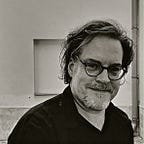Review: Robert Fripp’s Soundscapes Live, From the Contemplative to the Visceral
By Bradley Bambarger <2005>
Lowering expectations isn’t a common performance stratagem, but guitarist Robert Fripp seemed to want to do just that, as he began his solo “soundscapes” concert at the hall of the Society for Ethical Culture on Manhattan’s Upper West Side.
Fripp, 59, leader of the venerable yet ever-shifting avant-rock outfit King Crimson, started what he later termed his “bleeping and droning” unceremoniously as the audience was still filing in. Seated before a rack of digital-delay units blinking red and green, the English musician spent as much time tweaking dials as he did fingering synthesized tones from the electric guitar on his lap.
The sonic waves that washed over the warm, wood-lined room were characteristic of the contrapuntal atmospherics that Fripp has created since the mid-’90s, when he replaced the live looping of his analog tape-based “Frippertronics” with a new digital soundscapes technique. The recent performances (and their fine-tuned recordings) differ from his ’70s ambient collaborations with Brian Eno — as well as the duo’s latest album, The Equatorial Stars — in that they are more intense.
In King Crimson (not to mention his occasions moonlighting for the likes of David Bowie and David Sylvian), Fripp’s virtuoso guitar solos can leave listeners feeling like they were just mugged by a professor. With his soundscapes, relying on no organic guitar timbres and improvising with real-time electronics, Fripp made his instrument sound more like some celestial organ. The effect ranges from the contemplative to the almost uncomfortably visceral.
In one of the evening’s handful of pieces, a vaguely vocal sound wailed forth from the texture, as if there were banshees trapped in Fripp’s machines. Such spectral passages reinforced the impression that something like this music might be the sound people hear when they move toward the light in near-death experiences. On other occasions, the music seemed to take on a life of its own, as Fripp grappled with the echoing resonances before they threatened to hover out of his grasp.
The unpredictable combination of the virtually static and the overwhelmingly emotive is what makes Fripp’s soundscapes an acquired taste for some, along with his inscrutable stage presence. No one is more aware of this than the guitarist. After 40 minutes of music, he lightened the mood with an informal question-and-answer session; another half-hour of music ended the evening without fanfare.
With little in his voice to betray his rock roots, Fripp’s verbal manner can be equal parts vicar and lawyer, Zen master and wily British comedian. He was avuncular and witty at the Society for Ethical Culture, although his self-deprecating patience often seemed theatrical, as if he were ready with a cutting remark if even slightly provoked.
Fripp fielded queries regarding the keys and scales he employs for his improvisations (which are suggested by each hall’s acoustic and each audience’s reaction, he said, as well as his mood that day). Prodded, he spoke of his plans for King Crimson (open), although he expressed zero interest in discussing his technological apparatus. Asked about the spiritual impetus for his music, Fripp repeated a favorite line about placing his faith “in the inexpressible benevolence of the creative impulse.”
Noting the audience’s mostly male, over-30 makeup, Fripp drew much laughter by saying that he realized most teenagers can only listen to his soundscapes for about 10 minutes before running from the room; most women can only tolerate 20 minutes (30 if they really love their dates); and hardly anyone can listen to this music for more than 40 minutes at a stretch.
When he commented again on the generally “Crimson-unfriendly” attitude of women, Fripp finally sounded a bit more like a veteran rock star, with his voice colored not so much by pique as by a sigh.
(Originally published in 2005 in The Star-Ledger of New Jersey.)
